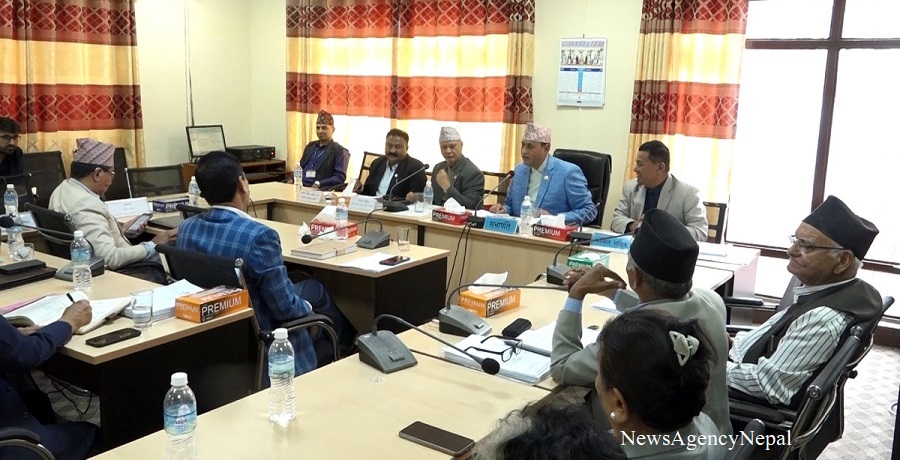
The Federal Civil Service Bill has been approved by the State Affairs and Good Governance Committee of the House of Representatives on Friday, 2082 Jestha 2. After nearly a year of clause-by-clause review, the bill has been finalized with key revisions.
Two-Year Cooling-Off Period After Retirement
The bill introduces a mandatory two-year "cooling-off period" before retired civil servants can accept public appointments. This provision aims to curb the trend of civil servants moving directly into constitutional, political, or diplomatic roles post-retirement.
Retirement Age Increased to 60
The retirement age for civil servants has been raised from 58 to 60 years. The bill also includes a provision for the position of Additional Secretary in the civil service.
Government Endorses Cooling-Off Period
During Friday's meeting, Home Minister Ramesh Lekhak announced the government’s endorsement of the two-year cooling-off period. However, Law Secretary Udayraj Sapkota expressed disagreement, suggesting that such a provision should instead be included under laws related to the Constitutional Council.
He noted that security personnel and university professors are exempt from similar restrictions. In contrast, lawmakers argued that placing the rule within civil service law is necessary, as Constitutional Council recommendations only apply to select appointments.
Gradual Implementation of Retirement Age
The committee has faced pressure from high-level officials approaching retirement, such as chief secretaries, secretaries, and joint secretaries. The Public Service Commission had recommended a phased approach:
-
58 years until the end of the current fiscal year
-
58 years 6 months for the first 6 months of the next fiscal year
-
59 years for the following year
-
60 years thereafter for all
However, under pressure from top officials, the bill allows civil servants set to retire within the first year to extend their service by one year, with the same option extended for those due to retire in the following year.
Trade Union Provision Maintained
Despite proposals from MPs including Chanda Karki (Rastriya Swatantra Party), Buddhi Man Tamang (Rastriya Prajatantra Party), and Ashok Kumar Rai (Janata Samajwadi Party) to either dissolve trade unions or limit them to non-gazetted staff, the current structure has been retained.
No legal provision has been made to regulate trade unions due to political affiliations and lobbying from employee groups. Committee members admitted they lacked the courage to push for a single official trade union, with MP Rajendra Pandey stating they "hesitated" despite a consensus.
MP Rai criticized politically affiliated union members for neglecting their duties and misusing power. He cited an example of a non-gazetted officer lobbying for a promotion to joint secretary.
Administrative Authority Transferred to Provinces
The bill includes provisions to align civil service with federalism:
-
Chief Administrative Officers at the local level will fall under the provincial government's jurisdiction.
-
Secretaries in provincial ministries will be part of the provincial civil service.
-
The federal service will fill the gap until the provincial public service commissions can supply personnel.
Reservation Limits and Entry Age
The bill limits civil service reservation benefits to two instances—once each for gazetted and non-gazetted posts.
The maximum age for civil service entry remains 35 for men, but is reduced from 40 to 39 for women.
Entry-Level Changes and Promotion Restrictions
Entry into the civil service has been restricted. If the bill passes Parliament unchanged, there will no longer be open competition for the Nayab Subba (non-gazetted) post. Open competition will only be available up to the post of Undersecretary.
The bill introduces the role of Additional Secretary while shortening tenure limits:
-
Chief Secretary’s tenure reduced to 2 years
-
Secretary’s tenure reduced from 5 years to 4 years
No tenure limit has been set for the Additional Secretary. These provisions will not apply to current officeholders.
Inter-Province Transfers Permitted
A civil servant working under one provincial service may now transfer to another province’s civil service. Initially, a minimum of 10 years’ service was required, but the revised bill now states a maximum of 10 years instead.
Concerns were raised that allowing such inter-provincial transfers may contradict the spirit of federalism.
Background and Legislative Path
The government registered the Federal Civil Service Bill in the House of Representatives on 21 Falgun 2080, aiming to streamline the administrative structure to suit federal governance and improve functionality.
The bill was forwarded to the State Affairs Committee for clause-by-clause discussion on 5 Jestha 2081.
Next Steps in the Legislative Process
Committee Chair Ramhari Khatiwada announced the bill's unanimous passage with amendments. RPP MP Buddhi Man Tamang submitted a written dissent, arguing that permanent civil servants should not have politically affiliated trade unions.
The bill will be submitted to the House of Representatives with the committee’s report. Upon endorsement, it will move to the National Assembly. Following approval by the National Assembly, it will return to the House and be forwarded to the President’s Office for certification.
Once certified by the President, the bill will become law.
Key Provisions at a Glance
-
Cooling-Off Period: Retired civil servants barred from public appointment for 2 years
-
Retirement Age: Increased from 58 to 60
-
Entry Age Limit: 35 for men, 39 for women
-
Open Competition: No open entry for Nayab Subba and posts above the Undersecretary (Upa Sachiv)
-
Tenure: 2 years for Chief Secretary, 4 years for Secretary
-
Trade Union: Existing structure retained
-
Inter-Province Transfers: Permitted with up to 10 years of service
-
Administrative Control: Local chief administrative officers under the provinces


